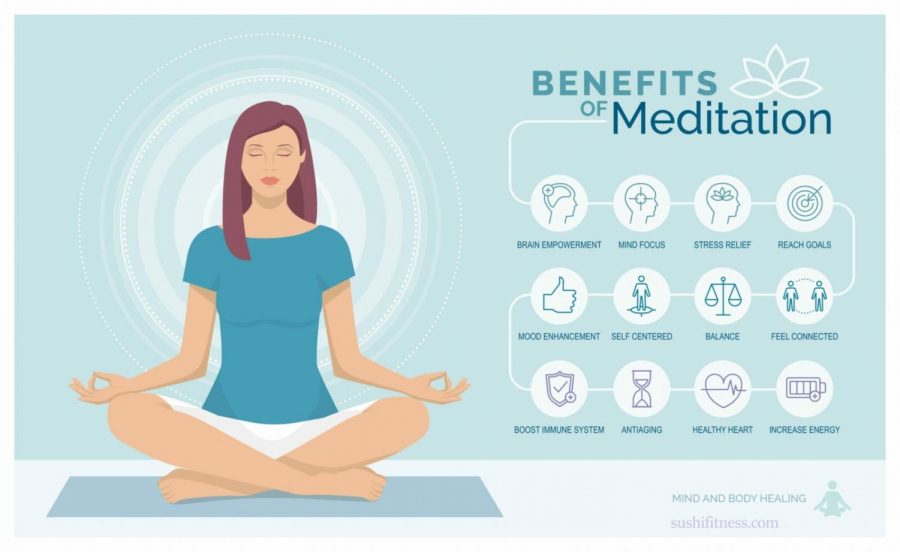Effects & Benefits of Meditation
Photo Courtesy of Sushi Fitness
Meditation makes for a calmer mind and eases anxiety. Try it!
November 3, 2020
Many people struggle with a short attention span, stress, and the inability to sit still. Meditation can help you to destress and keep your mind in a place that it should be. According to Healthline, stress reduction is one of the most common reasons to try meditation. If you have never tried meditation before, maybe now would be a good time to give it a chance. These are some of the benefits you could enjoy:
Reduced stress is one of the many benefits of meditation. According to Healthline, “Normally, mental and physical stress cause increased levels of the stress hormone cortisol. This produces many of the harmful effects of stress, such as the release of inflammatory chemicals called cytokines.” Meditation calms you down and then slows the release of the cortisol hormone.
When meditating, your anxiety is controlled. This goes hand in hand with stress reduction. Healthline states, “A meta-analysis including nearly 1,300 adults found that meditation may decrease anxiety. Notably, this effect was strongest in those with the highest levels of anxiety. Also, one study found that 8 weeks of mindfulness meditation helped reduce anxiety symptoms in people with generalized anxiety disorder, along with increasing positive self-statements and improving stress reactivity and coping.” If you or someone you know struggles with anxiety and high levels of stress, recommend meditation.
Meditation promotes emotional health. “For example, one review of treatments given to more than 3,500 adults found that mindfulness meditation improved symptoms of depression.” States Healthline. During times like these, more and more people are experiencing signs of depression. Experimenting with meditation may be a reasonable decision to make for the time being. There is no age limit, cultural, or religious limitations associated with meditation. “At Headspace, we like to think of meditation as exercise for the brain. Through meditation, we can build up areas of our brain and actually rewire it to enhance positive traits like focus and decision making and diminish the less positive ones like fear and stress. Most importantly, this means there is a possibility to change your brain for the better in a way that is long-lasting.” So, if you find it interesting, give it a shot.
Meditation can increase and lengthen your attention span. When one does focused meditation, the attention span of the person is increased and a weight is lifted. A study showed that people who practiced meditation performed better on a visual task and had a greater attention span than those without any experience in meditation. Headspace explains,“Whether it’s by reducing stress, improving sleep, increasing focus, or improving relationships, research shows mindfulness works.”
Believe it or not, meditation can generate positive feelings and thoughts. Healthline adds, “Some types of meditation may particularly increase positive feelings and actions toward yourself and others. Metta, a type of meditation also known as loving-kindness meditation, begins with developing kind thoughts and feelings toward yourself. Through practice, people learn to extend this kindness and forgiveness externally, first to friends, then acquaintances, and ultimately enemies.”
Finally, meditation can help improve sleep. Healthline claims, “One study compared mindfulness-based meditation programs and found that people who meditated stayed asleep longer and had improved insomnia severity, compared with those who had an unmedicated control condition. Becoming skilled in meditation may help you control or redirect the racing or runaway thoughts that often lead to insomnia.”
Whether you want to try something new, relax, learn to stay focused, or learn to be positive, meditation could be very beneficial and could quite possibly change your life.

